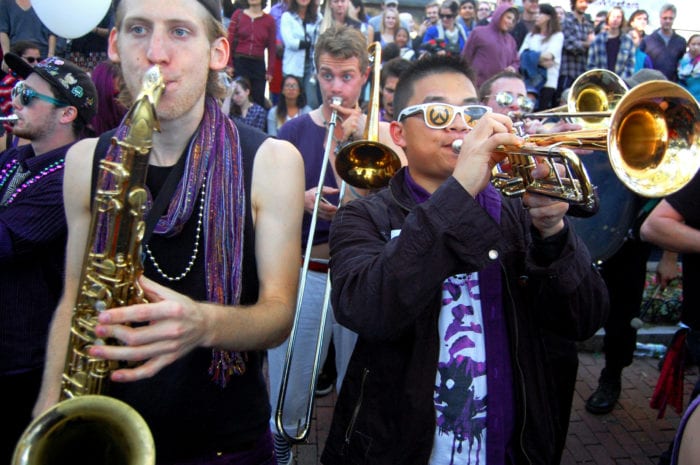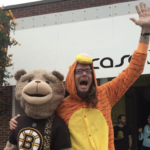
“The online festival will virtually transport us around the world to see how Honk has manifested across the globe.”
How do you adapt Honk!—Somerville’s annual festival of activist street bands—for coronavirus?
“Back when the pandemic first started we had no idea it would last all the way into October,” says Cecily Miller, one of the organizers. “We resisted as long as we could because the live qualities of the Honk festival are what we love about it, the intimacy of being right next to bands on the street, the friendships, the interactions between musicians and between musicians and the public, the dancing.”
But coronavirus’ continued dangers mean large crowds are out. Most of the big brass bands can’t even safely gather to practice.
Instead, organizers launched Honk! United (honkunited.org) for Oct 5 and 11. (The schedule is still developing, check the website for latest updates.) Rather than bringing dozens of bands here, the online festival will virtually transport us around the world to see how Honk has manifested across the globe and how it connects to older, regional traditions.
Honk! United plans to stream hours of music—recordings of live performances from Before Times, “isolation videos,” footage of bands at recent protests—plus people sharing “the stories behind their bands, behind their festivals, behind their movements for social justice, how they’re experiencing COVID on the ground,” Miller says.
Expect footage from Somerville, Vermont, New Hampshire, Seattle, Chicago, Austin, New Orleans, New York, Providence, Atlanta, Pittsburgh, Western Massachusetts, Minneapolis, Kentucky, Vancouver, Uganda, Chile, Australia, Costa Rica, Nicaragua, the United Kingdom, Rome, Berlin, Paris, Moscow, Belgium, Japan, Antarctica, and five Honk festivals in Brazil (where, Miller says, activist musicians have had instruments confiscated by police).
“We conceived it as no longer the Somerville festival,” Miller says. “We wanted it to be a shared collaborative coming together of all the Honk festivals that had to be cancelled this year.”
“Our U.S. Honk culture is particular, and I think a lot of it came out of street protests of the Iraq war,” says Trudi Cohen, one of Honk’s co-founders. “A lot of bands were formed in that time.”
One of those bands was Somerville’s Second Line Social Aid & Pleasure Society Brass Band, in which Cohen is a drummer. It was an ad hoc band outfit that assembled to play at protests in 2003 and decided to continue playing together. They came to wonder if there were similar bands.
The first Honk festival in Davis Square in 2006 featured 12 bands they found that were part of this percolating movement of street bands. The annual parade from Davis Square to Harvard Square was added the following fall. The festival grew to dozens of bands and up to 10,000 revelers each October. “We’ve had people say it’s their favorite holiday,” Miller says.
(I’ve been around Honk since early on, as a friend of some of the organizers. I’ve photographed the festival since the second year—a slideshow of my pictures is part of Honk! United. My sweetheart Kari Percival and I have helped groups develop their presentations for Honk parades, and we designed the 2018 Honk logo.)
Honk didn’t invent these bands, but arose from “recognizing that that music culture was erupting and tapping into it,” Cohen says. Bringing the bands together alerted musicians to peers and helped bands share skills and inspirations. New bands formed.
New Honk festivals debuted—New York in 2007; Pronk in Providence and Honk Fest West in Seattle in 2008; Honk TX in Austin in 2011; Crash in Detroit and Pittonkatonk in Pittsburgh in 2014; Honk Oz in Wollongong, Australia, Honk Rio in Rio de Janeiro, Brazil, and a Honk festival in Eugene, Oregon, in 2015; Freemantle, Australia, and Sao Paulo, Brazil, in 2017; and Vancouver, Spokane and Basilia in 2018. Last year saw the debut of Honk festivals in Syracuse; Toronto; Santo Domingo, Costa Rica; and Belo Horizonte and Porto Alegre, Brazil. (Cohen notes that bands participating in Honk! United from Europe, Africa and Japan represent older traditions, independent from Honk. “We’re allies.”)
This spread is an extraordinary accomplishment for a cultural creation from Boston in the past quarter century. And even more extraordinary because it has spread as a do-it-yourself, grassroots project—not as a big business entertainment industry creation. The spinoff Honks aren’t franchises, but a movement.
“For me, it’s always been about the joy of participatory music and the feeling of acceptance for expressing my own beliefs and actions,” says Mike Antares, who has helped organize Honk TX and Honk Fest West. He discovered Honk as a photographer. “I did not have the connection to music or marching bands or brass bands. … I saw the magic these people were creating for others and this confidence and joy they had for each other, and I wanted that.”
He began learning drumming to find his way into Austin’s Minor Mishap Marching Band and later Seattle’s Chaotic Noise Marching Corps. “It was scary. The first year I really felt an extraordinary sense of impostor syndrome,” the Seattle resident says. “Over time people just continued to express acceptances and curiosity and, what’s more, they were sharing their knowledge.”
David Rooney—a trumpet player and head of band programs at Wollongong Conservatorium of Music, an hour’s drive south of Sydney, Australia—says he learned about Honk while working to revive a town concert band. He was impressed by the energetic music, colorful costumes, the community ethos. He wrote to some of the bands. Honk musicians visited from the United States and encouraged him and associates to launch their own festival, which they did in 2015.
“Because our David is a music educator and I am as well, he really felt part of this festival is people would learn more about the music and how to play it,” says Lotte Latukefu, Honk OZ cofounder, a singer and Rooney’s partner.
Days of workshops precede the Australian festival. They also invite “unattached musicians” to play in the pick-up Hoot band. “We have so many people now who have connected through Honk and founded their own activist bands all over Australia,” Latakefu says. “That’s a really interesting part of the Honk phenomenon.”
“When we ask people about Honk the word ‘joy’ comes up so often,” Miller says. “It’s like the joy of being alive is distilled into the music, how the music makes your body feel, the camaraderie of being part of a crowd that’s having this powerful shared experience, the fact that everybody’s happy, and it’s completely removed from commerce.”
Because of coronavirus, “for the most part, bands are not playing or at least they’re taking extended hiatuses,” Cohen says. “In Europe, they were playing again and now they’re shut down again.”
Miller says, “I have heard from Honk organizers how different their lives have become and how demoralizing it is to not be able to come together and practice and perform outside and have that uplifting and rejuvenating experience of performing for an audience.”
Many Honk bands have recorded “isolation videos”—they all play at home separately, then edit the video into a big band. A number have also performed live at Black Lives Matter and other protests, sometimes shifting from brass ensembles to only percussion as a pandemic safety measure.
Honk! United, Cohen says, is “a way to be together when we can’t be together.” May it be an antidote to pandemic isolation and the racist, fascist forces who want us to feel divided and lonely in our opposition. Honk United offers the hope of reconnecting with allies around the globe in music and activism and joy.
Greg Cook runs the Wonderland blog (https://gregcookland.com/wonderland/) and is scheduled to begin painting a mural in Salem's Punto Urban Art Museum in October (http://puntourbanartmuseum.org).

